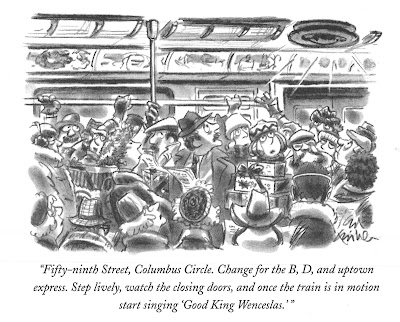 |
| This example of procrastination turned into stewardship first appeared in the New Yorker magazine. |
For many folks, Christmas ended on the 25th. I was amused to see people proudly post online that they had already de-Christmased their homes on the 26th...taking down the wreaths, tree, ornaments, nativity scenes...in order to get things back to normal. For others, Christmas ends a little later on, but truthfully few still observe all twelve days of Christmas that actually start on December 25th. Instead, we all have our own schedules and ways of ending things.
Can you remember how the first Christmas story ends? Luke 2 says, "all who heard it were amazed at what the shepherds said to them. But Mary treasured up all these things and pondered them in her heart." Something about that line about Mary is interesting to me. It says people were amazed at the moment - the baby, the manger, the pitiful surroundings, the shepherds, the star - but that Mary apparently hung on to it all longer than just the moment. She kept it. Christmas was longer than a day or even a season.
Some of you are saying, "Sure she did, she had a newborn on her hands and did not have a choice." But I don't think that is what Luke is talking about. I think he wants us to know that Mary was paying attention, and that the implications of the significance of that first Christmas were not lost on her. Things had changed; not just for her but maybe for the whole world.
We could learn from Mary. It is worth remembering that out of all the women on earth, God did choose her to bring the Savior into the world. We all could stand to allow the truths of Christmas to linger a little longer in our hearts, too. God becoming flesh and blood, as the writer John tells the Christmas story, is something new altogether. God has done a new thing. Maybe we can take our old ways...and packed them up with all of those ornaments and decorations. Grace and Peace to you, Scott


